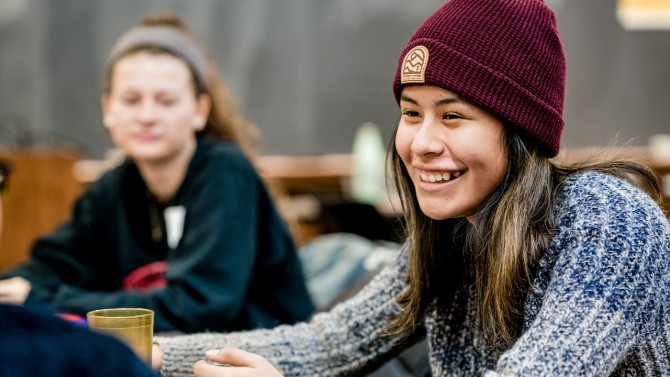CALS peer mentors support new first-generation students
A year ago, the College of Agriculture and Life Sciences (CALS) piloted a peer mentoring program designed for incoming first-generation students.
Its success was demonstrable: The 60 first-year students who fully engaged with the mentoring programs earned GPAs that averaged 0.61 higher than those who didn’t. That’s the difference between a B-plus and a B-minus.
Thanks to that success – and the need for additional peer support during the age of COVID-19 – CALS has now welcomed its second cohort into the program, which has expanded to include 22 incoming transfer students along with 50 first-year students.
Developed by the CALS Office of Academic Programs, CALS Office of Undergraduate Admissions and CALS Office of Student Services, the program pairs upperclassmen with incoming students based on majors and general demographic information. Mentors reach out to their mentees over the summer and typically connect with them in-person during orientation.
The upperclassmen also participate in a one-credit class during the fall semester, which helps them build mentoring skills, connect with fellow mentors, and learn more about other support networks available through Cornell.
This structured approach is key to building a successful and sustainable program, said Sue Merkel, the program leader and associate director of academic programs.
“Peer mentoring supports students who need it, and it also provides mentors training and interpersonal skills that will be valuable in whatever they do in the future,” Merkel said. “It’s a win-win situation.”
Within CALS, 17% of incoming freshmen are the first in their families to attend college. For first-gen students, certain parts of the experience, such as campus culture and terminology, can be confusing. However, students find it’s perhaps less intimidating to ask a peer to explain the context of words like “prelim” and “office hours” than it is to reach out to a faculty adviser.
The program’s goal is to help students feel more closely connected to the campus environment and to help them bridge gaps in academic success and psychological well-being.
“Because my parents didn’t come from an academic background, it was harder to explain what was going on here and to articulate everything that is Cornell. That was probably the hardest part,” said Melissa Montego ’23, a mentee in the fall 2019 cohort. “The peer mentoring program reassured me as a first-generation student that I’m not alone and that I have the resources here to help me succeed.”
Mentors benefit from guidance by Cornell Health, the Learning Strategies Center and members of the Intergroup Dialogue Project. Joseph Thorsrud ’20 said the trainings gave him a completely new perspective on the challenges that many first-generation students face.
“I’m hoping to remain in academia, so learning about the hidden barriers that first-generation students face has made me more conscientious in my own teaching,” he said. “I’m trying to be sure that I’m not coming in with assumptions about how to support them.”
To better understand the impact of the program, Merkel worked with Neil Lewis, Jr. ’13, an assistant professor of communication who conducts research on academic achievement, and Zach Berry, M.S. ’20, a doctoral student who studies organizational behavior. They surveyed the students and will use the resulting data to help address gaps in the program.
Two points of emphasis this year will be developing peer mentor-mentee relationships with physical distancing and helping the mentees to build communities. Throughout the fall semester, the students have multiple opportunities to engage with their mentors in the program – allowing the researchers to see how much participation matters for improving academic success.
Results from the first cohort showed that engagement mattered a lot. Those who participated with the program at every opportunity throughout their first semester at CALS reaped the largest benefits. And while female students in the program saw the greatest gains, male students still averaged 0.15 higher GPAs than their non-participating peers.
Lewis said this type of holistic intervention is the kind of approach that helps students succeed, and it reduces disparities in academic achievement.
“Part of a student’s academic success is making sure they are having a good psychological experience on campus,” Lewis said. “Providing academic guidance as well as social support helps students to navigate the often difficult, but important, journey of collegiate life.”
Media Contact
Get Cornell news delivered right to your inbox.
Subscribe

